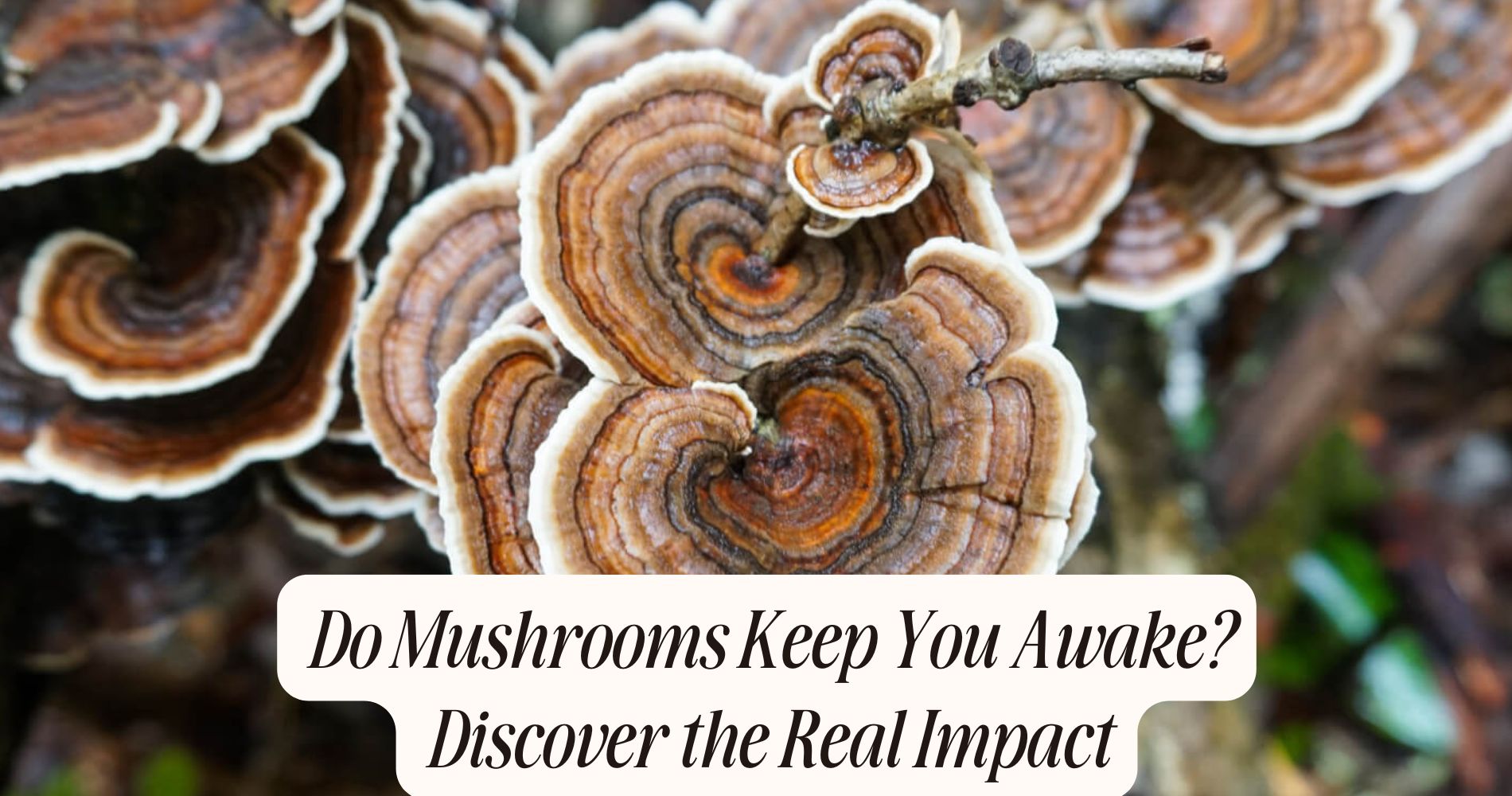
Do Mushrooms Keep You Awake? Discover the Real Impact
Do mushrooms keep you awake? Mushrooms can affect your sleep in varied ways. Certain types, like reishi, promote relaxation and improve sleep quality, while others, like lion's mane, may increase alertness if consumed late in the day. Nutrients found in mushrooms, such as B vitamins, may enhance sleep quality. Be cautious, too; some mushrooms with effects similar to caffeine can disrupt sleep. Individual responses vary, so it's crucial to experiment with timing and types. By choosing calming varieties and the right preparation methods, you can optimize your mushroom consumption for better sleep. There's much more to uncover about the impact of mushrooms on your well-being.
Understanding Mushroom Varieties
Mushrooms come in a wide array of varieties, each offering unique benefits and characteristics. When exploring these varieties, you'll discover that many have significant medicinal properties. For instance, varieties like reishi and lion's mane are well-known for their potential to boost immunity and enhance cognitive function. These mushrooms have been used in traditional medicine for centuries, and modern research continues to validate their health benefits.
On the culinary side, mushrooms are incredibly versatile. You can find types like shiitake and portobello gracing your plates, adding flavor and texture to various dishes. Their umami taste makes them a popular choice in vegetarian and vegan cooking, providing depth in meals that might otherwise lack it.

Additionally, certain mushrooms like chanterelles and morels can elevate a dish's gourmet appeal, making them prized in fine dining.
Understanding the variety of mushrooms available not only enhances your cooking but also provides insight into their potential health benefits. By incorporating a range of mushrooms in your diet, you can enjoy both their culinary uses and their medicinal properties, leading to a more enriched and health-conscious lifestyle.
Nutritional Components of Mushrooms
The nutritional profile of mushrooms makes them a valuable addition to any diet. They're low in calories yet rich in essential nutrients, including vitamins D, B, and minerals like selenium and potassium.
Different mushroom types, such as shiitake, portobello, and cremini, offer unique flavor profiles and health benefits, making them versatile for various culinary uses.
When it comes to preparation techniques, you can sauté, grill, or roast mushrooms to enhance their umami flavor. These cooking methods also help retain their nutritional value.
For those with dietary restrictions, mushrooms are a great plant-based protein source, ideal for vegans and vegetarians. However, you should always be aware of safety concerns, as some wild mushrooms can be toxic.
Incorporating mushrooms into your meals not only adds depth to your dishes but also contributes to overall health. Research indicates that regular consumption may support immune function and reduce inflammation.
Whether you're adding them to soups, salads, or stir-fries, mushrooms provide a hearty and nutritious option that aligns with various dietary needs. Embracing their diverse culinary uses can elevate both flavor and health in your diet.
Effects of Mushrooms on Sleep
When considering how mushrooms affect sleep, it's crucial to look at their nutritional components and how different varieties may influence your rest.
Certain mushrooms contain compounds that may promote relaxation and help regulate sleep cycles.
Nutritional Components and Sleep
Exploring the nutritional components of mushrooms reveals their potential impact on sleep quality. Mushrooms are rich in several essential nutrients that can influence your sleep hygiene. For instance, they contain B vitamins, such as riboflavin and niacin, which are important for energy metabolism and can help regulate sleep-wake cycles.
Moreover, mushrooms provide dietary fiber and antioxidants, which support overall health and may contribute to better sleep. A well-balanced diet, including mushrooms, can enhance your dietary habits, leading to improved serotonin levels. Serotonin is a precursor to melatonin, the hormone responsible for regulating sleep.
Additionally, certain types of mushrooms, like reishi, are known for their adaptogenic properties, which can help reduce stress and promote relaxation. Stress management is essential for quality sleep, making these mushrooms a valuable addition to your nighttime routine.

While mushrooms alone won't guarantee a good night's sleep, incorporating them into a balanced diet, alongside good sleep hygiene practices, can create a more conducive environment for restful slumber.
Varieties and Their Effects
Variety plays a crucial role in how different mushrooms can impact your sleep. For instance, Reishi mushrooms are renowned for their calming effects. They've been used in traditional medicine to reduce anxiety and promote relaxation, potentially aiding your sleep quality.
On the other hand, Lion's Mane mushrooms may enhance cognitive function but could keep you alert, especially if consumed late in the day.
The cooking methods you choose can also influence the effects of these mushrooms. Lightly sautéing or adding them to soups can preserve their medicinal benefits, while heavy frying might diminish some of their nutrients. For best results, consider incorporating these mushrooms into your diet earlier in the day.
Additionally, some varieties, like Cordyceps, are known for their energizing properties. If you're looking to wind down at night, it's wise to avoid these types late in the evening.
Research Studies and Findings
Investigating the connection between mushrooms and sleep has led to intriguing findings that highlight their potential benefits for sleep quality. Recent research explores mushroom chemistry, revealing compounds like polysaccharides and ergothioneine, which may influence sleep cycles.
Studies suggest that certain mushrooms, such as reishi and lion's mane, possess adaptogenic properties, potentially reducing stress and anxiety, both of which are known to disrupt sleep.
For example, a study published in the Journal of Ethnopharmacology found that reishi mushrooms greatly improved sleep quality in participants, likely due to their calming effects on the nervous system. Similarly, lion's mane may promote the production of nerve growth factor, contributing to better brain health and potentially enhancing overall sleep quality.
However, it's crucial to note that while some mushrooms may support restful sleep, others, like psilocybin mushrooms, could lead to altered consciousness and mightn't be conducive to a good night's rest.
Personal Experiences and Anecdotes
When you try incorporating mushrooms into your routine, you might notice changes in your sleep patterns and overall energy levels.
Some people report improved restfulness, while others experience different effects based on their personal tolerance levels.
Sharing your experiences can help shed light on how mushrooms influence sleep for various individuals.
Sleep Patterns Observed
Many people have shared their experiences with mushrooms and how these fungi influence their sleep patterns. For some, mushroom consumption seems to enhance sleep quality, leading to deeper and more restorative rest. Users often report that specific varieties, particularly adaptogenic mushrooms like reishi, help them unwind before bed, reducing anxiety and promoting relaxation.

On the flip side, others have noticed that certain mushrooms, especially those containing higher levels of caffeine, can disrupt their sleep. They find that consuming these types in the afternoon or evening leads to restlessness and difficulty falling asleep.
Interestingly, the effects can vary widely among individuals. Some claim that moderate consumption of mushrooms helps them wake up refreshed and energized, while others experience a lingering impact on their sleep cycles.
This variability suggests that the relationship between mushroom consumption and sleep quality isn't one-size-fits-all. It's essential to pay attention to how different mushrooms affect your own sleep patterns.
Experimenting with timing and types of mushrooms may help you find a balance that enhances your overall rest and well-being.
Energy Levels Noted
Personal anecdotes about energy levels after consuming mushrooms highlight a fascinating spectrum of experiences. Many individuals report an immediate energy boost after integrating mushrooms into their diets, particularly varieties like lion's mane or cordyceps. These mushrooms are often linked to increased stamina and cognitive function, which can help combat fatigue during demanding days.
Conversely, some people have shared mixed experiences. While certain mushrooms provide noticeable fatigue relief, others may inadvertently lead to sluggishness, especially if consumed in larger quantities. Factors such as personal metabolism, the type of mushroom, and preparation methods can all influence these outcomes.
For example, one person noted that after taking lion's mane in the morning, they felt an enhanced focus and energy throughout their workday. Another individual, however, experienced a dip in energy levels when consuming shiitake mushrooms late in the evening.
Ultimately, your experience may vary based on how your body reacts to different mushrooms. Paying attention to your own responses can help you find the right balance, allowing you to harness the potential energy benefits while minimizing any adverse effects.
Personal Tolerance Levels
Individual tolerance levels to mushrooms can vary considerably, shaping how each person experiences their effects. This variability often stems from individual differences in metabolism, body weight, and overall health.
For instance, you might find that a small amount of mushrooms keeps you alert, while someone else may consume the same quantity and feel perfectly relaxed.
Understanding your tolerance thresholds is essential. Some people may react to certain compounds in mushrooms, such as psilocybin or even caffeine found in some species, differently than others.
If you notice that mushrooms tend to energize you at night, it's wise to monitor your intake and adjust accordingly.
Personal anecdotes often highlight these differences; one person might share a story about a late-night mushroom meal leading to an unexpected burst of energy, while another might recount a peaceful night's sleep after their dose.
This diversity in experiences emphasizes the importance of tailoring your consumption based on your unique response. By paying attention to how mushrooms affect you personally, you can make informed choices that align with your sleep and energy needs.
Recommendations for Mushroom Consumption
When considering mushrooms for sleep enhancement, it's essential to choose the right types and prepare them properly. Certain mushroom types, like reishi and lion's mane, are known for their calming effects and potential health benefits.
For best results, you can use various cooking methods, such as sautéing or steaming, which help retain their nutrients and enhance their flavor profiles.
Pairing foods can also elevate your mushroom dishes. For example, combining reishi mushrooms with soothing herbs like chamomile or lemon balm can amplify their relaxing qualities.

Consider using preparation techniques like making a broth or tea, which can be a gentle way to incorporate these mushrooms into your diet.
Serving suggestions include adding sautéed mushrooms to your evening meals, or blending them into smoothies for a nighttime snack.
Remember to start with small amounts to gauge your body's response.
By exploring the culinary uses of mushrooms, not only will you enjoy their unique flavors, but you'll also harness their potential benefits for better sleep.
Energize Naturally with 10-IN-1 MUSHROOM GUMMIES
If you’re curious about do mushrooms keep you awake, Well Gummies’ 10-IN-1 MUSHROOM GUMMIES offer a balanced, natural way to support energy and focus without affecting sleep quality. Each gummy contains 10 functional mushrooms, including reishi, designed to fuel your brain, provide calm, steady energy, and enhance immune support. With a fresh wild berry flavor, these vegan gummies deliver sustained focus and clarity—no jitters, no crash—so you can stay energized during the day and still enjoy restful nights. Try them for a convenient boost to your daily wellness routine.
Frequently Asked Questions
Can Certain Mushrooms Cause Allergic Reactions Affecting Sleep?
Certain mushroom allergies can cause sleep disturbances by triggering allergic reactions. If you notice symptoms like itching, swelling, or respiratory issues after consuming mushrooms, it's best to consult a healthcare professional to address potential sleep-related concerns.
Do Mushrooms Interact With Sleep Medications?
Certain mushrooms, like psychedelic ones, can interact with sleep medications, potentially altering their effectiveness. While some mushrooms may serve as sleep aids, it's essential you consult a healthcare professional before combining them with any medications.
Are There Specific Mushrooms That Promote Wakefulness?
Certain mushrooms, like Lion's Mane and Cordyceps, can promote wakefulness benefits and cognitive enhancement. Their bioactive compounds may boost energy and mental clarity, making them a valuable addition to your daily routine for improved alertness.
How Do Cooking Methods Affect Mushrooms' Impact on Sleep?
Cooking techniques influence mushroom nutrients, which can affect your sleep. For instance, steaming preserves more nutrients compared to frying. Choosing the right method helps maximize health benefits and can impact your overall sleep quality.
Can Consuming Mushrooms Lead to Nightmares or Disturbed Sleep?
Consuming mushrooms may impact your sleep quality due to certain mushroom compounds. While some individuals report nightmares, others experience no disturbance. It's crucial to reflect on personal reactions and the types of mushrooms you consume.
Conclusion
To summarize, mushrooms can influence your sleep, but their effects vary depending on the type and your individual response. While some varieties may promote alertness due to their nutritional components, others might have calming properties. It is crucial to take into account personal experiences and scientific research when incorporating mushrooms into your diet. By understanding the specific types you consume, you can better manage their impact on your sleep and overall well-being.




